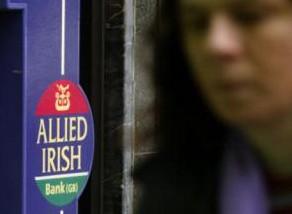FF backbenchers and AIB - two of Ireland's finest stalwarts

Two sturdy stalwarts of our time were on the national stage last week: bold, defiant and heroic - by their own lights, anyway. Both were defending national institutions in their care, without fear or favour. Well, without fear.
The first of these stalwarts was the phalanx of Fianna Fáil backbenchers who have defined contemporary Irish politics in a way that none of us commentators have succeeded in doing. Politics is now no longer about the great issues:
Articles 2 and 3 of the Constitution, the revival of the Irish language, the reunification of the country. Politics is now about saving the public houses of rural Ireland.
No other issue in years has so stirred the Fianna Fáil backbench TDs, certainly not since the smoking ban. Not Nama and its risk to the solvency of the Irish state. Not the cervical cancer immunisation that would save the lives of young women. Not the withdrawal of medical cards from some of the over-70s. Not increasing class sizes. Not the imposition of an income levy on some of the poorest.
Just the saving of public houses in rural Ireland.
It is easy to sneer at the Fianna Fáil backbenchers - Bobby Aylward, Mattie McGrath and the rest - who have led the charge on saving the public houses of rural Ireland. But who else in politics has stood for anything else, aside from that ‘‘impatience to surf the political wave of competitive outrage’’, about which our departed Ceann Comhairle spoke so aptly?
Fine Gael is engaged in a project of discovery, finding out what it stands for. The only unique selling point its leader could advance at the party’s presidential dinner, last Saturday week, was the abolition of the Seanad.
A few months ago, he perceived it to be at the heart of our institutional framework:
"I see a new role for the Seanad entirely. The system of voting has got to be changed. Every graduate should be entitled to vote for the Seanad. I see real opportunities for connection with Europe. It should be the forum where MEPs can address the Seanad. It should be able to examine European legislation in a real scrutiny way. It should be a forum where delegations can come and make their case on national issues and the whole lot of it should be on a parliamentary [TV] channel," he said.
In fairness, that is a little more advanced that the raison d’etre of the Greens: the abolition of fur farming.
The Labour Party seems unconcerned about a raison d’etre, seeing as how surfing the political wave of competitive outrage has proved such a hit. No grand idea, or even a pretence of a grand idea, on how justice and equity might emerge triumphant from the economic and financial debris.
No challenge to the prevailing common sense that only through expenditure cuts in welfare, education, health and the pay of the poorly-paid in the public service can the country be rescued.
The other sturdy band of stalwarts, according to the website of its corporation, is committed to "the highest standards" of corporate governance: the long-serving directors of AIB.
Under their stewardship, one of the great financial institutions of this society was brought to the brink of insolvency by their reckless incompetence.
Two years ago, the bank’s share price was €16.60. Last Thursday, it was at €2.50. The reason it is not at €0 is because the state has bailed it out, first through a guarantee to all its depositors and, shamefully, to bondholders, then through a capital injection of €3.5 billion, and finally (so far) by the state’s willingness to take from the bank’s balance sheet the reckless loans it made while pursuing its "highest standards" of corporate governance.
Also on the AIB website is a section dealing with what it calls Corporate Social Responsibility (CSR).Honest.
It says that, in 2008,when its recklessness was such that it had to beg the state for assistance, ‘‘significant progress’’ was made in environmental initiatives and - hilariously - in an updated Better Ireland programme. Sitting on the board of this corporation are David Pritchard, Kieran Crowley (one of the corporate social responsibility fellows), Colm Doherty, Stephen Kingon (another of the corporate social responsibility fellows), Sean O’Driscoll (the third corporate social responsibility fellow), Robert Wilmers and Jenny Winter.
All have been on the board for at least three years; all bear responsibility for the corporate social vandalism the bank has perpetrated. All, presumably, are now defying the bank’s saviour, the state, over the appointment of a new chief executive and awarding a 3 per cent pay rise to its employees at a time when the rest of society has been burdened by the consequences of the bank’s vandalism.
Amazingly, some of these directors have been delivering their thoughts, unchallenged, on the airwaves on how the rest of us should survive the crisis that they had such a part in creating. But at least the Fianna Fa¤ il backbenchers and the AIB directors stand for something.
